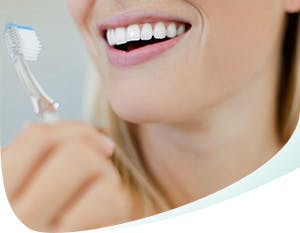What Is Nighttime Bruxism? How to Manage it and More
It’s common for many people to clench their jaws when they feel stressed or upset, but if you find that you’re constantly waking up with a sore jaw, you may want to talk to your dentist about the possibility of nighttime bruxism.
What Is Nighttime Bruxism?
If someone has bruxism, they are experiencing the unconscious, involuntary excessive grinding of the teeth or forward thrusting of the jaw.1,2 This phenomenon can exist if you’re awake, sometimes known as diurnal or daytime bruxism, or while you’re sleeping, also called nocturnal bruxism.2 Researchers believe that daytime bruxism has different causes from bruxism that occurs while you’re sleeping.1
While you’re sleeping, there is forceful contact between the biting surfaces of your teeth.1 Over time, this unconscious habit can have negative impacts on your oral health, and even causing your teeth to crack.2
Symptoms
It can be hard to tell if you’ve been consistently grinding your teeth while asleep, but there are a few signs that may tip you off:1,2,3
- Disrupted sleep.
- Facial pain or headaches when you first wake up in the morning.
- Tooth sensitivity to hot or cold temperatures.
- Earaches.
- Loose teeth
- Sore jaw muscles.
- Worn down teeth or small fractures on the teeth.
- Pain while eating.
- Jaw locking up.
- Clicking or popping in the jaw, a sign of stress on the joints that allow you to open and close your mouth.
What Causes Bruxism During Sleep?
Nighttime bruxism is an involuntary, repetitive movement that is characterized as being rhythmic or non-rhythmic.1 It’s not considered a sleep or movement disorder on its own but may be a sign of breathing difficulties like snoring on the mild end of the spectrum, and sleep apnea on the other.1,3 While it’s not categorized as a disorder, it is considered a risk factor due to the increased risk of oral complications.1
However, there are other factors at play that can increase the severity and frequency of nighttime teeth grinding:3,4
- Smoking tobacco and caffeinated drinks
- Stress and anxiety
- Alcohol
- Certain recreational or illegal drugs
- Medical disorders such as Parkinson’s disease, dementia, and gastroesophageal reflux disorder (GERD)6
How Does Sleep Bruxism Affect Your Teeth?
One of the symptoms of nighttime bruxism is also one of its greatest detriments. Grinding your teeth in your sleep is incredibly hard on the muscles in your jaw and on your teeth and their enamel.2 Researchers estimate that people who experience bruxism in their sleep will clench their jaw or bite down with a force that is at least six times greater than normal.2
This can cause damage to your teeth that ranges from tooth wear to surface cracks or broken teeth.2 The stress from repeatedly biting down with extreme force can also damage the tissues that support the teeth, causing them to loosen and if not addressed, can lead to tooth loss.2,4
Research has indicated that the progression of tooth wear is fasted in those who experience bruxism, so finding a way to manage this issue is paramount to protect and preserve your teeth.5
Treating Nighttime Bruxism
Talk to your dentist if you notice any of the symptoms of bruxism during sleep, especially jaw pain, chipped teeth or headaches.3 Your dentist may have a range of suggestions for you, depending on the severity of the problem and your lifestyle. Some of these may include:1,3,4
- Quitting smoking and the use of tobacco
- Limiting your caffeine intake
- Identifying the medications that you’re taking to see if they’re a risk factor
- Awareness of teeth clenching during the day
- Avoiding chewing gum
- Keeping non-food items like pens out of your mouth
Stress may be considered a factor in nighttime bruxism.4 Apart from your dentist, you may also want to speak to a healthcare provider about ways to decrease the amount of stress in your daily life. They may suggest options like physical therapy, meditation, getting enough exercise and even a kind of talk therapy called cognitive behavioral therapy.4
One of the most effective means for treating nighttime bruxism is with a night guard, which covers all the surfaces of the teeth and helps to prevent tooth wear.1,4 There are inexpensive and generic ones at drugstores, but you can also ask your dentist to have one made specially made for you.1
While no toothpaste can reduce the damage cause by bruxism, it’s important to care for your teeth and protect your enamel from everyday acids. A specialty toothpaste like Pronamel Active Shield Whitening Toothpaste can help give you a stronger, brighter smile. It’s proven to reinforce acid-weakened enamel and starts building resistance today to help keep your teeth strong and healthy for life.^
^with twice daily brushing
Source Citations :
- Bruxism Management. National Library of Medicine. https://www.ncbi.nlm.nih.gov/books/NBK482466/. Accessed 7/7/23.
- What is Bruxism? Journal of the American Dental Association. https://jada.ada.org/article/S0002-8177(21)00381-0/fulltext. Accessed 7/7/23.
- Your Teeth and Jaws Under Pressure. Journal of the American Dental Association. https://jada.ada.org/article/S0002-8177(17)31105-4/fulltext. Accessed 7/7/23.
- Bruxism (Teeth Grinding). Cleveland Clinic. https://my.clevelandclinic.org/health/diseases/10955-teeth-grinding-bruxism. Accessed 7/7/23.
- Bruxism and its effect on teeth. National Library of Medicine. https://pubmed.ncbi.nlm.nih.gov/265365/. Accessed 7/7/23.
- Bruxism (teeth grinding). Mayo Clinic. https://www.mayoclinic.org/diseases-conditions/bruxism/symptoms-causes/syc-20356095/. Accessed 11/21/2023.




